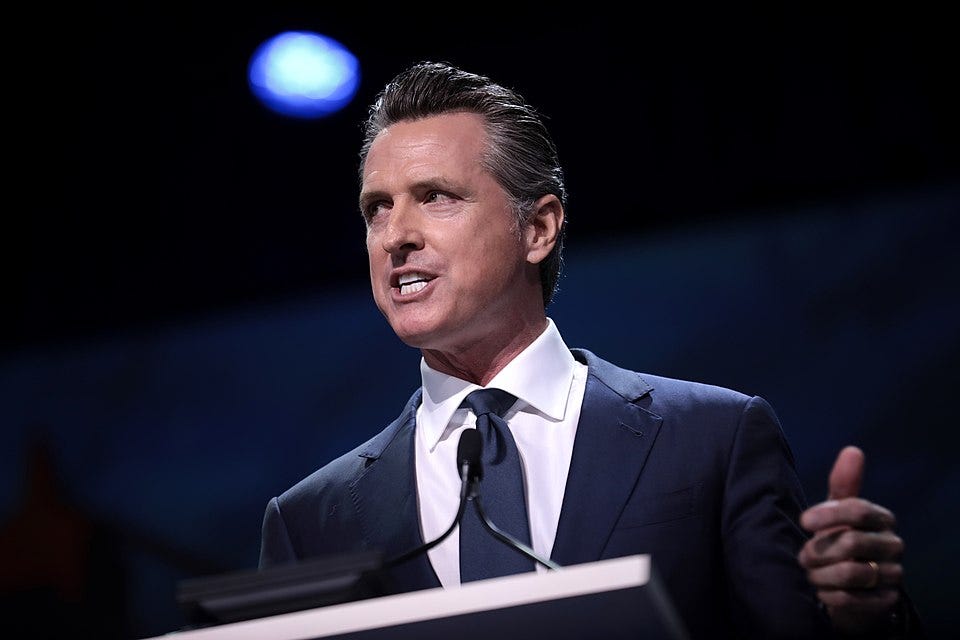Gavin Newsom Vetoes Important HRT Stockpiling Bill For Trans Californians, Signs Other Pro-LGBTQ+ Bills
The bill would have allowed transgender people to maintain a safe supply of medication in the era of government crackdowns on care.
Yesterday, California Governor Gavin Newsom signed a slate of pro-LGBTQ+ bills, earning quick praise from supporters who heralded the move as evidence of his commitment to equality. But buried beneath the wave of approval was a quieter, far more consequential act: a veto on an important protection bill for the transgender community. Newsom rejected a bill that would have allowed transgender people—and anyone using hormone therapy—to maintain a 12-month supply of their medication, a backstop designed to protect access amid federal crackdowns and supply disruptions. The bill would have also amended healthcare protection laws to explicitly protect gender identity. For many in the trans community, that veto could be far more consequential than any of the other bills signed.
The bill, Senate Bill 418, passed with huge majorities earlier this year, with 60 votes for it and 18 against in the California assembly, and 29 votes for it and 10 against in the California Senate. The bill would mandate that insurers and pharmacists dispense 12 months of hormone therapy for those prescribed, unless a doctor specifically requested less. It also would state that discrimination on the basis of sex would explicitly include gender identity when it comes to insurance coverage: a key provision given that multiple California hospitals have dropped treatment for transgender youth in the wake of threats from the Trump administration. Now, this provision will not go into law given the Governor’s veto.
In his veto message, Newsom cited concerns about rising healthcare costs for other Californians, writing, “I am concerned about the limitation on the use of [utilization management], which is an important tool to ensure that enrollees receive the right care at the right time. Prohibiting this cost containment strategy is likely to result in an increase in enrollee premiums to offset costs incurred by health plans and insurers.” It’s a familiar refrain—one often used to justify limiting transgender healthcare access and, more broadly, restricting medication supplies and protections that could shield all medical patients from systemic instability.
There’s also little evidence to support Newsom’s justification. Hormone therapy is among the least expensive forms of prescription medication. Generic estradiol tablets often cost under $20 for a 90-day supply, while injectable versions are modestly higher. Testosterone, though pricier at around $100–$150 per month, remains far cheaper than the brand-name drugs routinely covered by insurers that are responsible for driving up healthcare prices. In short, these medications sit firmly in the low-cost tier of prescriptions—making the governor’s claim that they could meaningfully drive up premiums hard to square with the facts.
A nearly identical law already exists in Washington, where HB 1971 passed earlier this year with broad bipartisan support—including several Republicans. The measure, like California’s SB 418, allows patients to receive a 12-month refill of prescribed hormone therapy. During debate, one Republican legislator defended the bill by citing his daughter’s reliance on hormone medication after pituitary cancer, arguing that long-term refills protect patients who depend on stable access. His remarks persuaded six other Republicans to join Democrats in passing the measure 40–9. Since the law took effect, Washington has not reported any premium increases that are expected for the 2026 plans attributable to this law.
SB 418 would have been a critical backstop for transgender Californians facing care disruptions. Under the Trump administration’s ongoing campaign of pressure and extortion, several clinics in the state have shut down programs for trans patients under 19 years old, abruptly cutting off access to hormone therapy access. The bill could have given those patients a lifeline—allowing them to maintain a year’s supply of medication while navigating court battles or searching for new providers. For many, that stockpile would mean the difference between continuity of care and medical crisis. With rationing, a 12-month supply can last even longer, up to two years, which could help trans people weather political storms and trans youth make it to adulthood with their medication supply intact. Among all of the legislation passed this year, few bills would have offered such tangible protection for transgender people as SB 418—and yet, it’s the one that won’t become law.
To be sure, Newsom did sign several bills expanding protections for trans and queer Californians. One measure shields the medical records of transgender youth care providers from out-of-state subpoenas and, in very limited cases, from federal law enforcement. Another streamlines the process for transgender people to change their names and gender markers. He also signed legislation making it easier for queer couples to adopt, protecting clinics from violent threats, and ensuring privacy for those undergoing legal gender changes. These are all meaningful steps forward—each building on California’s reputation as a stronghold for LGBTQ+ rights—but they don’t erase the sting of his decision to veto one of the most practical, life-impacting protections the trans community could have received this year already passed by at least one other state.
Newsom’s veto is a stark reminder that California is no longer the unquestioned leader on transgender rights that many once believed it to be. In recent months, the governor has courted conservative influencers and echoed anti-trans talking points, even as state agencies under his watch have quietly looked the other way while clinics drop transgender youth from care in what amounts to mass capitulation to the Trump administration. California may still pass progressive legislation, but leadership is measured not by symbolic gestures—it’s measured by the courage to act when it matters most. And when it came to the bill that could have made the most tangible difference for transgender people this year, Gavin Newsom failed that test.



We need to make certain this man is not the the DEM nominee for the 2028 election.
Gavin Newsom is no friend of trans people. "Rising health care costs"? We're 0.7% of the population.